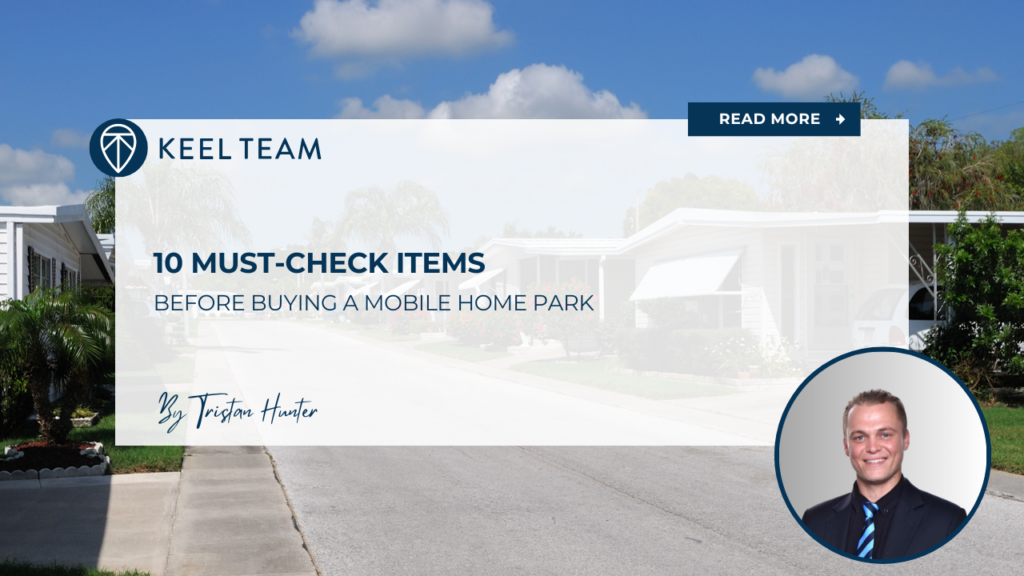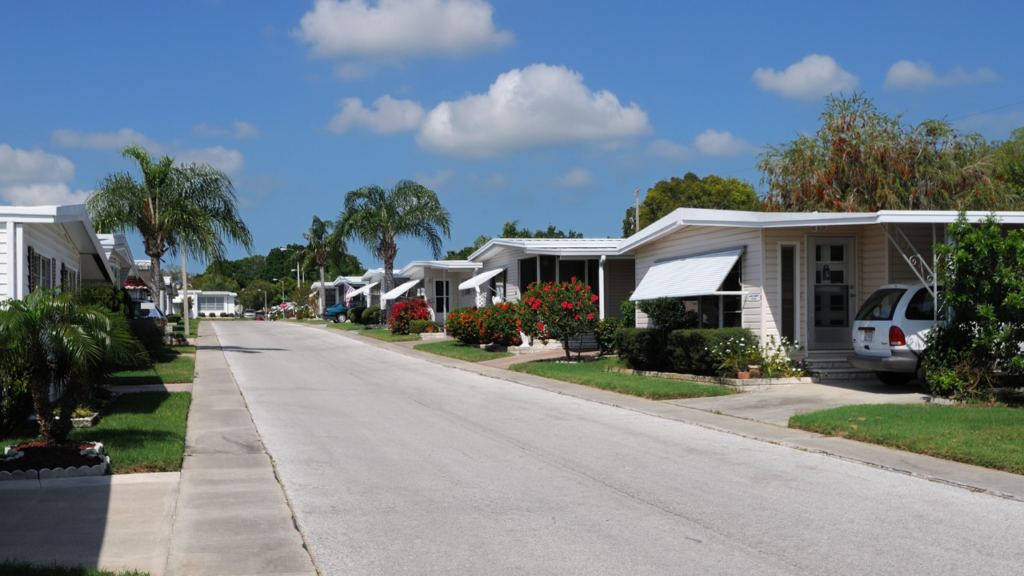10 Must-Check Items Before Buying a Mobile Home Park
-
 Tristan Hunter - Investor Relations
Tristan Hunter - Investor Relations

Investing in a mobile home park can offer a pathway to steady income and long-term growth, but it’s not a decision to make lightly. The process involves careful evaluation to ensure the property aligns with your financial goals and operational capabilities. By thoroughly inspecting key aspects of a mobile home park, you can make an informed choice and avoid costly surprises. Below, we outline 10 critical items to check before signing on the dotted line. This guide uses clear, actionable steps to help you navigate the process with confidence.
Why Due Diligence Matters for Mobile Home Parks
Before diving into the specifics, understand that due diligence is your safeguard. A mobile home park may look promising on paper, but hidden issues like infrastructure problems or legal complications can derail your investment. By examining these 10 areas, you’ll gain clarity on the property’s condition, profitability, and potential risks.
1. Verify Zoning and Permits
Start by confirming the mobile home park’s zoning status. Local regulations dictate how the land can be used, and not all properties zoned for residential use allow mobile home parks. Contact the local zoning office to ensure the property complies with current laws. Additionally, check for necessary permits, such as those for utilities or expansions. Missing permits could lead to fines or restrictions on operations.
How to Check Zoning
- Visit the local planning department or check their online portal.
- Request a zoning verification letter for the property.
- Confirm any grandfathered statuses, as older parks may operate under outdated rules.
2. Inspect the Infrastructure
The condition of a mobile home park’s infrastructure directly impacts maintenance costs. Focus on utilities like water, sewer, and electrical systems. Aging pipes or outdated septic systems may require expensive upgrades. Similarly, check the condition of roads, streetlights, and common areas. Poor infrastructure can deter tenants and inflate your budget.
Key Infrastructure Checks
- Hire a professional to inspect sewer and water lines for leaks or corrosion.
- Evaluate electrical systems for capacity and safety compliance.
- Assess road conditions for signs of wear that could affect accessibility.
Download our FREE eBook on the Top 20 things to know BEFORE investing in mobile home parks!
3. Review Financial Records
A mobile home park’s financial health reveals its profitability. Request at least three years of financial statements, including income, expenses, and occupancy rates. Look for consistent revenue and reasonable operating costs. Be cautious of inflated income projections or unexplained expenses, as these may signal mismanagement.
What to Look For
- Compare rental income against market rates for similar mobile home parks.
- Analyze vacancy trends to gauge demand.
- Check for outstanding debts or liens that could transfer with the purchase.
4. Evaluate Tenant Quality and Leases
Tenants are the backbone of a mobile home park’s income. Review current lease agreements to understand terms, rent amounts, and renewal dates. Additionally, assess tenant reliability by checking payment histories. High turnover or frequent late payments could indicate management issues or an undesirable location.
Tenant Evaluation Tips
- Meet tenants, if possible, to gauge satisfaction and community dynamics.
- Confirm lease terms align with local regulations.
- Look for long-term tenants, as they suggest stability.
5. Assess Market Demand
The success of a mobile home park often hinges on demand for affordable housing in the area. Research local demographics, employment rates, and housing trends. A growing population or limited housing options can signal strong demand. Conversely, a declining economy or an oversaturated market may hurt occupancy.
How to Research Demand
- Check local housing reports or consult a real estate agent familiar with mobile home parks.
- Analyze competing parks for occupancy and rental rates.
- Consider proximity to amenities like schools, stores, and workplaces.
6. Investigate Environmental Concerns
Environmental issues can pose significant risks. Flood zones, soil contamination, or proximity to hazardous sites may affect the property’s value and safety. Conduct an environmental site assessment (Phase I ESA) to identify potential problems. Addressing these issues after purchase can be costly and time-consuming.
Environmental Red Flags
- Check FEMA flood maps to determine flood risk. Consider calling the local City to verify.
- Look for signs of prior industrial use that could indicate contamination.
- Hire an environmental consultant for a thorough assessment.
7. Examine Management and Operations
A well-run mobile home park requires efficient management. If the current owner manages the property, ask about their processes for maintenance, tenant screening, and rent collection. If you plan to hire a manager, factor in the cost. Poor management can lead to tenant dissatisfaction and financial losses.
Management Questions to Ask
- How are maintenance requests handled?
- What is the process for resolving tenant disputes?
- Are there established vendor relationships for repairs?

8. Check for Legal Issues
Legal complications can derail your investment. Investigate any pending lawsuits, code violations, or disputes involving the mobile home park. These issues may require costly resolutions or damage the property’s reputation. A clean legal record provides peace of mind.
How to Uncover Legal Problems
- Request a title report to identify liens or encumbrances.
- Check with the local municipality for code violation records.
- Consult an attorney to review contracts and legal documents.
9. Analyze Expansion Potential
If you aim to grow the mobile home park, evaluate its expansion potential. Check if the property has unused land or the ability to add more home sites. However, expansion often requires zoning approval and infrastructure upgrades, so factor in these costs.
Expansion Considerations
- Confirm zoning allows additional home sites.
- Assess whether utilities can support expansion without major upgrades.
- Estimate the return on investment for adding new sites.
10. Understand Financing Options
Financing a mobile home park differs from traditional real estate. Lenders may require higher down payments or charge higher interest rates due to perceived risks. Explore loan options, such as conventional loans, seller financing, or specialized mobile home park lenders. Understanding financing early helps you budget accurately.
Financing Tips
- Shop around for lenders experienced with mobile home parks.
- Prepare a detailed business plan to strengthen your loan application.
- Clarify terms, including interest rates and repayment schedules.
Final Thoughts on Buying a Mobile Home Park
Purchasing a mobile home park can be a rewarding venture, but it demands thorough preparation. By checking these 10 items—zoning, infrastructure, financials, tenants, market demand, environmental concerns, management, legal issues, expansion potential, and financing—you can position yourself for potential success. Each step aims to reduce risk and clarify the property’s value. Work with professionals like inspectors, attorneys, and real estate agents to help ensure accuracy. With careful planning, you can be better prepared to invest in a mobile home park that aligns with your goals.
Are you looking for MORE information? Book a 1-on-1 consultation with Andrew Keel to discuss:
- A mobile home park deal review
- Due diligence questions
- How to raise capital from investors
- Mistakes to avoid, and more!
Disclaimer:
The information provided is for informational purposes only and is not investment advice or a guarantee of any kind. We do not guarantee profitability. Make investment decisions based on your research and consult registered financial and legal professionals. We are not registered financial or legal professionals and do not provide personalized investment recommendations.

Tristan Hunter - Investor Relations
View The Previous or Next Post
Subscribe Below 👇





